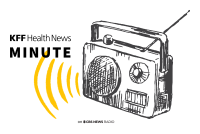Latest KFF Health News Stories
Health Care Heartaches: Your Winning Health Policy Valentines
KFF Health News shares our favorite reader-submitted health policy valentines. One struck us in the heart and inspired an original cartoon.
Clinics Sour on CMS After Agency Scraps 10-Year Primary Care Program Only Months In
A planned 10-year federal program called Making Care Primary was supposed to help primary care doctors by easing administrative burdens, allowing them to focus on improving patients’ health. A year after the Trump administration eliminated the program, federal officials created an alternative plan that favors companies.
RFK Jr. Made Promises in Order To Become Health Secretary. He’s Broken Many of Them.
Before being confirmed to lead the Department of Health and Human Services, Robert F. Kennedy Jr. told U.S. senators he would not cut funding for vaccine research or change the nation’s official vaccine recommendations. He did both.
Trump Team’s Planned ACA Rule Offers Its Answer to Rising Premium Costs: Catastrophic Coverage
Sweeping changes to the Affordable Care Act marketplace next year have been proposed by the Trump administration that focus on making more insurance plans available with higher annual out-of-pocket costs but lower premiums.
What the Health? From KFF Health News: New Flu Vax? FDA Says No Thanks
It’s been a busy week at the FDA, with a political appointee overruling agency scientists to reject an application for a new flu vaccine. Meanwhile, anti-abortion Republicans on Capitol Hill complain the agency is dragging its feet on reviewing the abortion pill mifepristone. Jackie Fortiér of KFF Health News, Lizzy Lawrence of Stat, and Alice Miranda Ollstein of Politico join KFF Health News’ Julie Rovner to discuss these stories and more.
Alabama’s ‘Pretty Cool’ Plan for Robots in Maternity Care Sparks Debate
Alabama, a state with one of the nation’s highest infant mortality rates, is betting on robots to help fix its maternal care crisis. But the state’s plan for telerobotic ultrasounds in rural areas has raised doubts.
Louisville Found PFAS in Drinking Water. The Trump Administration Wouldn’t Require Any Action.
After detecting a sudden spike in PFAS in its drinking water, the city traced it upstream along the Ohio River to a factory in West Virginia. But the EPA has relaxed Biden-era plans to regulate PFAS levels. So what happens next?
End of Enhanced Obamacare Subsidies Puts Tribal Health Lifeline at Risk
Tribal insurance programs give Native Americans access to affordable health care when the Indian Health Service falls short. Those plans are threatened by the expiration of enhanced Affordable Care Act subsidies.
New Medicaid Work Rules Likely To Hit Middle-Aged Adults Hard
Republicans have said new rules requiring many Medicaid participants to work 80 hours a month will pinpoint unemployed young people who should have jobs. Policy researchers say the rules are more likely to disrupt coverage for middle-aged adults, harming their physical and financial health.
Listen to the Latest ‘KFF Health News Minute’
The “KFF Health News Minute” brings original health care and health policy reporting from our newsroom to the airwaves each week.
Obamacare: el impacto de los costos en las inscripciones no se conocerá hasta dentro de varios meses
Los subsidios mejorados, que redujeron el porcentaje del ingreso familiar que se debía pagar por la atención médica y eliminaron el límite de ingresos para calificar, expiraron a fines del año pasado.
Trabajadores de salud pública renuncian antes de ir a Guantánamo
Oficiales del Servicio de Salud Pública que trabajaron en Guantánamo el año pasado describieron las condiciones en las que se encontraban los detenidos inmigrantes.
La falta de médicos de atención primaria es un problema nacional. Algunas grandes redes de salud están recurriendo a la inteligencia artificial en busca de soluciones.
Obamacare Sign-Ups Drop, but the Extent Won’t Be Clear for Months
Experts say Affordable Care Act sign-up data won’t be clear until people who were enrolled have paid — or haven’t paid — their new, often much higher, premiums.
US Cancer Institute Studying Ivermectin’s ‘Ability To Kill Cancer Cells’
At a January event organized by allies of health secretary Robert F. Kennedy Jr., National Cancer Institute Director Anthony Letai said results may be released “in a few months.” Ivermectin, used to deworm horses and other animals, has become a symbol of resistance against the medical establishment among supporters of Kennedy’s “Make America Healthy Again” agenda and many conservatives.
This Ballad Hospital, Flooded by Hurricane Helene, Will Be Rebuilt for $44M in a Flood Plain
Ballad Health, the nation’s largest state-sanctioned hospital monopoly, plans to rebuild Unicoi County Hospital on land that two climate modeling companies say is at risk of flooding.
With fractures emerging in the Make America Great Again movement, some Republicans are looking to capitalize on its “MAHA” counterpart ahead of the midterms.
Public Health Workers Are Quitting Over Assignments to Guantánamo
U.S. Public Health Service doctors and nurses are being deployed to Guantánamo and other detention centers as President Donald Trump escalates mass arrests in his campaign to curb immigration. Some have resigned in protest. Others offer a rare look into bleak conditions.
Journalists Describe Drivers of High Health Costs and Spell Out the Science of Protein
KFF Health News journalists made the rounds on national and local media recently to discuss topical stories. Here’s a collection of their appearances.
Newsom Tries To Thread Needle on Immigrant Health as Ambitions Turn National
Get our weekly newsletter, The Week in Brief, featuring a roundup of our original coverage, Fridays at 2 p.m. ET.




















